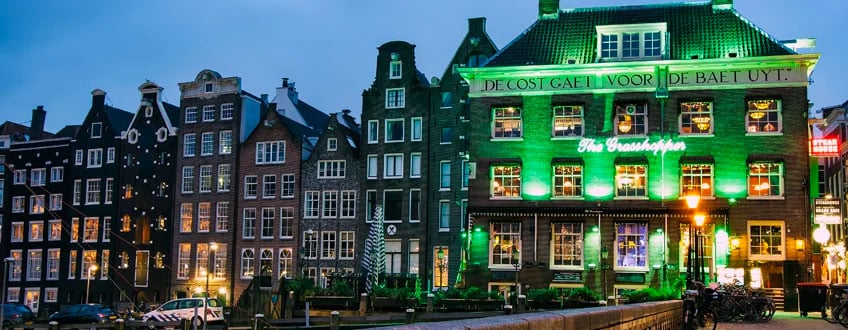.

Are These Germany's New Top Cannabis Firms?
While not confirmed by the government, it appears that there are five finalists for the German bid to grow medical cannabis domestically. The firms on this list are all established, and most of them hail from Canada.
The German government has apparently made at least one decision about who will grow medical cannabis in Germany. There are now apparently five finalists in consideration. This list has not, however, been confirmed by the government.
Dr. Werner Knöss, the head of the Cannabis Agency responded by email when asked to comment. He said, “BfArM is following tasks which are defined by the legislation. The ongoing procedure is confidential and we are not allowed to provide any information. The names of the successful participants will be published, when the tender procedure will have been completely finished.”
That said, this list has been independently confirmed by industry sources.
For industry watchers globally, in fact, it bears few surprises if true. Canadian firms dominate the list. All are power producers, with strong domestic operations also now under expansion. All have a presence in multiple global markets. This includes Germany. It also includes Australia.
One thing is impressively clear. The pot biz has graduated officially to the cannabis industry. These firms are cash-rich and facing an exploding market.

WHO ARE THESE FIRMS?
 Maricann (CSE:MARI): This company has plenty of green to support its vision. They just closed $42.5 million in financing for German expansion. This is intended to build out and repurpose an old Cargill plant in the former East Germany. The depressed economy locally, plus tax credits make this a super smart play in-country. Another smart move? Their corporate headquarters are located in Munich, home to all things German health insurance. The board is also packed with heavy hitters in the German healthcare and insurance industries.
Maricann (CSE:MARI): This company has plenty of green to support its vision. They just closed $42.5 million in financing for German expansion. This is intended to build out and repurpose an old Cargill plant in the former East Germany. The depressed economy locally, plus tax credits make this a super smart play in-country. Another smart move? Their corporate headquarters are located in Munich, home to all things German health insurance. The board is also packed with heavy hitters in the German healthcare and insurance industries.
 Bedrocan: By far, this firm has the most established track record of the list. This Dutch firm, founded as a family company, grew to become a government supplier in a lucrative monopoly. They also pioneered medical exports, particularly to places like Israel before the country began cultivating their own cannabis. One would think the company would have their hands full right now. The coffeeshop grow system is getting more legit. It is clear the industry is heading toward a lucrative path domestically and throughout the European continent. However, not all is well in Holland. Most health insurers dropped coverage of medical cannabis by the end of Q1 this year. Bedrocan, as a result, is an established, well-known producer in search of a new medical market. Why not the one right next door? Schengen borders being what they are, this is a fascinating proposition.
Bedrocan: By far, this firm has the most established track record of the list. This Dutch firm, founded as a family company, grew to become a government supplier in a lucrative monopoly. They also pioneered medical exports, particularly to places like Israel before the country began cultivating their own cannabis. One would think the company would have their hands full right now. The coffeeshop grow system is getting more legit. It is clear the industry is heading toward a lucrative path domestically and throughout the European continent. However, not all is well in Holland. Most health insurers dropped coverage of medical cannabis by the end of Q1 this year. Bedrocan, as a result, is an established, well-known producer in search of a new medical market. Why not the one right next door? Schengen borders being what they are, this is a fascinating proposition.
 Spektrum Cannabis: This is the beginning of a global medical brand established in Germany. It is backed by the largest GMP-certified Canadian LP – Canopy Growth Corp. (OTC:TWMJF). Aka – “Canada’s first pot unicorn.” Spektrum was actually founded in Germany by an American expat and German stem cell biologist under the flag of MedCann GmbH. The company obtained the first import licences for Canadian cannabis in the summer of 2016. Canopy bought out MedCann over Christmas and a subsequent rebranding began. Today, they have a distribution reach of about 500 pharmacies in Germany and growing. Like the others on this list, Spektrum also has an impressively deep reach of scientists and researchers to guide its development.
Spektrum Cannabis: This is the beginning of a global medical brand established in Germany. It is backed by the largest GMP-certified Canadian LP – Canopy Growth Corp. (OTC:TWMJF). Aka – “Canada’s first pot unicorn.” Spektrum was actually founded in Germany by an American expat and German stem cell biologist under the flag of MedCann GmbH. The company obtained the first import licences for Canadian cannabis in the summer of 2016. Canopy bought out MedCann over Christmas and a subsequent rebranding began. Today, they have a distribution reach of about 500 pharmacies in Germany and growing. Like the others on this list, Spektrum also has an impressively deep reach of scientists and researchers to guide its development.
 Aurora Cannabis (OTC:ACBFF): So far, this is the only company of the finalists to make a public announcement on July 12. Their wholly owned subsidiary, Pedianos was on the list. Two weeks later on July 24, the company rang the opening bell of the Toronto Exchange to mark the beginning of their trading on the exchange. Very impressive for a company that only began commercial operations 18 months ago. Aurora also has market presence in Australia.
Aurora Cannabis (OTC:ACBFF): So far, this is the only company of the finalists to make a public announcement on July 12. Their wholly owned subsidiary, Pedianos was on the list. Two weeks later on July 24, the company rang the opening bell of the Toronto Exchange to mark the beginning of their trading on the exchange. Very impressive for a company that only began commercial operations 18 months ago. Aurora also has market presence in Australia.
 ABcann (TSXV:ABCN): This firm was one of the earliest licence recipients in Canada. More recently on July 12, the same day that Aurora announced their inclusion in the finalists lists, this company announced listings on German and American stock exchanges. It might have been intended as a subtle hint. Regardless, they too mean business. An impressive board is also worth mentioning, including Raphael Mechoulam, the Israeli research pioneer.
ABcann (TSXV:ABCN): This firm was one of the earliest licence recipients in Canada. More recently on July 12, the same day that Aurora announced their inclusion in the finalists lists, this company announced listings on German and American stock exchanges. It might have been intended as a subtle hint. Regardless, they too mean business. An impressive board is also worth mentioning, including Raphael Mechoulam, the Israeli research pioneer.
WHAT DOES THIS MEAN FOR THE INDUSTRY?
Beyond a doubt, this is an interesting time for the global industry. However, the apparent winnowing of finalists to these five firms says something even more interesting.
It is clear that the German government is trying to cover its bets until growing commences here – supposedly by 2019. That means they need strong ex-im partners with skin in the game. From a volume perspective, that means that Canadian firms will be expected to provide the bulk of the German medical market from now until 2019. Only the largest LPs can do that. Further, they will also have to meet strict international shipping and compliance processes.
In the process, however, what this is doing is creating a valuable, Euro-centred medical market with connections to every other major medical market. A grow industry in Germany could theoretically supply neighbours leery about medical reform (including France). It will also continue to professionalise and globalise the industry itself.

WHAT DOES THIS MEAN FOR MEDICAL REFORM?
Beyond a doubt, the German market will help establish yet another country with a regulated market. That it is so closely tied to Canadian market developments is also interesting. In both markets, insurance companies are still reluctant to cover the drug. The development of two medical markets, supplied by the same firms, will also begin to define this issue more clearly. For everyone. It is highly likely that an American model for health insurance coverage (for example) will come out of this discussion.
It is also highly likely that the rest of Europe, at least, will seriously get on the medical bandwagon in some way.
WHAT DOES THIS MEAN FOR RECREATIONAL REFORM?
While the German bid has absolutely nothing to do with recreational reform, it also does. All the companies who are being considered from the Canadian market are both rec and medically focussed. In their home market, this means that these firms will be supplying a rec market as well as of next year.
Where that will take similar discussions in other countries is very unclear.
That starts with Germany. If Angela Merkel wins a fourth term, which she is expected to do, medical reform is the only thing on the cards for the next four years. There well may be city experiments to ease the growing impatience domestically on the rec front. This also might be done in conjunction with BfArm. Who knows at this point? A lot of this is still open water.
Other places, however, might also be impacted. This includes Spain, Switzerland, Italy and even Holland - all of which are toying with changing regulations.
Bottom line? Regardless of whether some or all of these firms make the next cut, one thing is crystal clear:
The medical cannabis market has arrived in Europe in force. And for the most part, it has a distinctly Maple Leaf flavour.

































